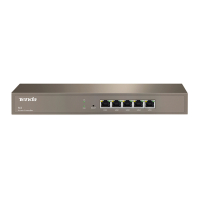33
AP's frequency band. It may be 2.4 GHz or 5 GHz or 2.4 GHz and 5 GHz.
AP’s SSID(s). If more than one SSID is delivered to AP, it displays all SSIDs when the cursor is hovering
over.
The amount of online users which connect to the AP.
AP's wireless transmission power. If this value is greater than the maximum supported power of an AP,
the maximum supported power takes effect after the policy is delivered.
RSSI is short for Received Signal Strength Indication.
If a wireless client’s signal is lower than this value, the client can not connect to the AP, which helps the
client to connect to an AP with stronger signal.
5G priority refers to a scenario when a dual band client connects to a dual band AP, the AP makes it
connect to 5 GHz band in higher prority, which helps the AP to reduce interference and workload in 2.4
GHz band and hence improve user experience.
The firmware version of the AP.
AP’s connection status:
Online: The AP has been connected to the AC successfully and the AC can manage the AP.
Offline: The AP has not been connected to the AC. The AC cannot configure the AP. In this status,
settings on the AP are saved and you can still connect to it wirelessly if you do not reset your AP.
If the AP is offline, it keeps configuration delivered before. Users can still use their wireless network unless
the AP is restored to factory settings.
Used to modify the AP’s RF settings.
If Status and Action does not appear in this page, please zoom in the page, e.g. 125%, and then drag the slider at the
bottom of the page so that you can view the AP’s status and click in Actions field to modify AP parameters.

